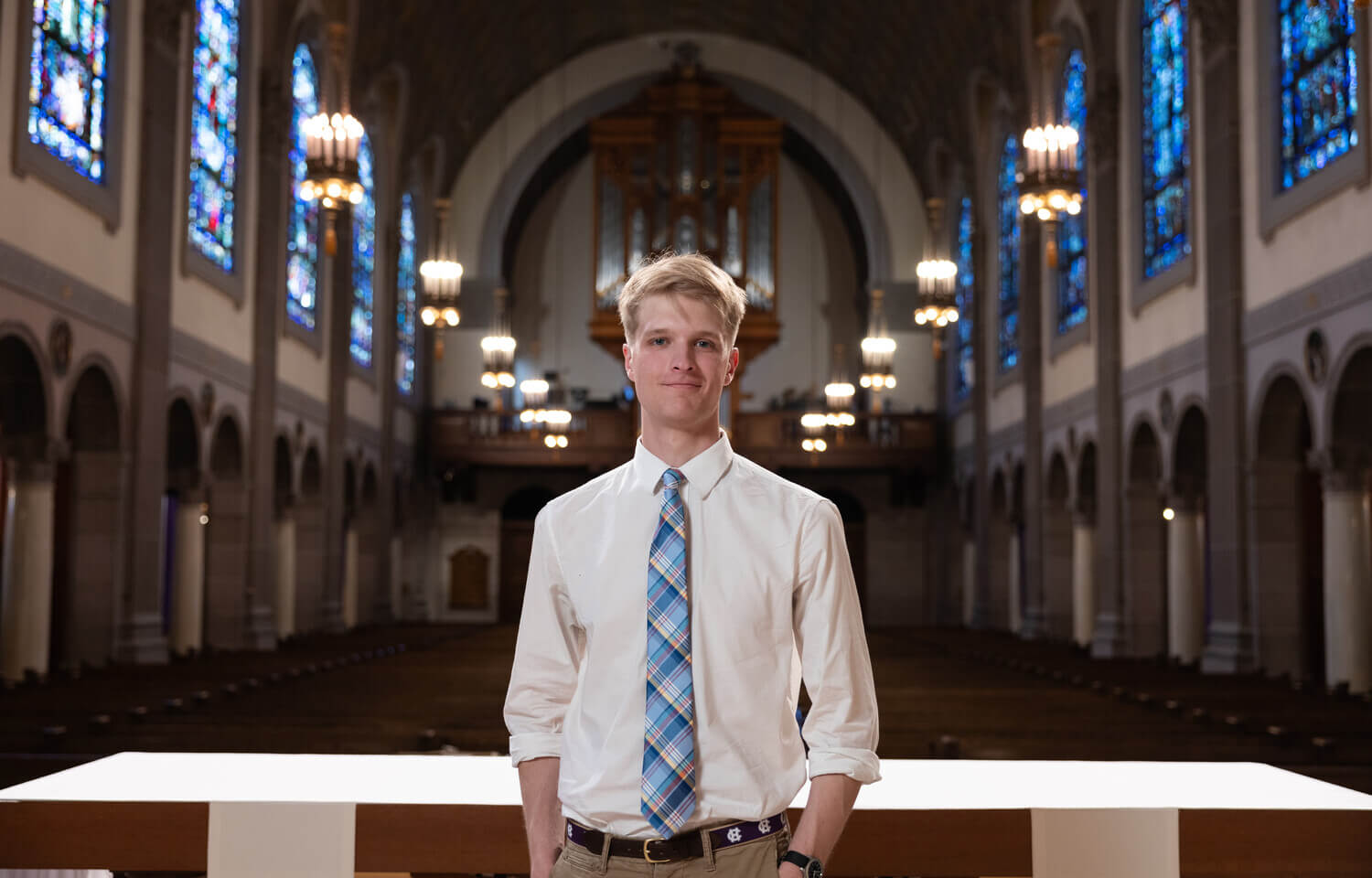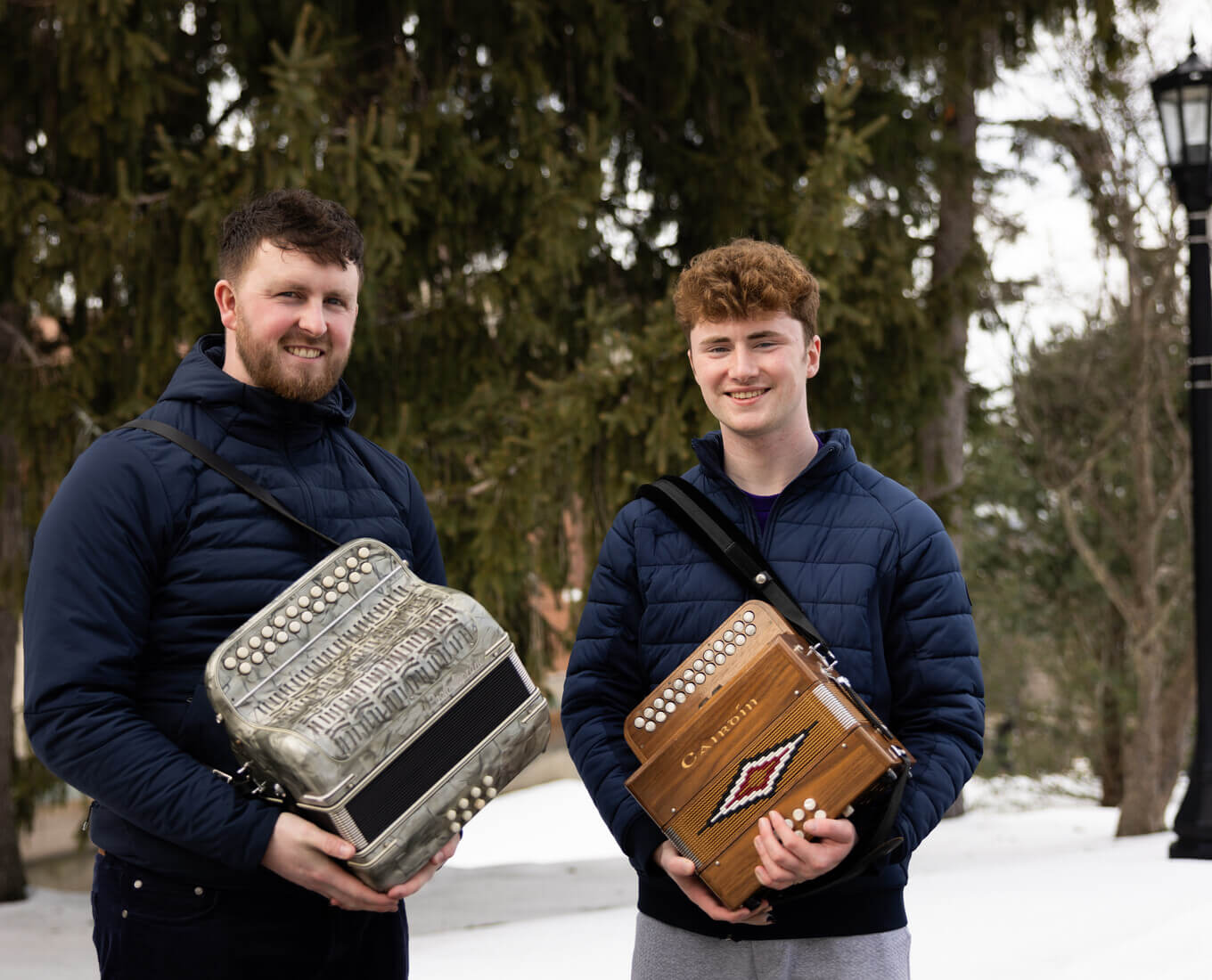When Gavin Klein ’26 was a child, he visited Paris with his family. One memory stands out: “I just remember walking into Notre Dame, and you look up at probably the most famous organ in the world.”
In the roar of that organ, “the power of God is unleashed,” he noted, “and that image, to this day, has stuck with me.”
It’s also influenced his musical journey: Klein went on to take lessons around his hometown of Bolton, Massachusetts, and today is the class of 2026 Organ Scholar, which every other year affords one incoming student a full-tuition scholarship and a rare opportunity to study an instrument that few, even in the music world, have played. Given its prestige, Klein called the opportunity “the equivalent of a football scholarship — it’s a huge honor.”
Only halfway into 2025, the year has already been a big one for Klein. He was selected as one of three finalists in the National Undergraduate Organ Competition, held in March.
“I never expected, 10 years ago, that I’d go to Iowa and place second in the Super Bowl of organists,” he said.
Klein has also been celebrated by The Diapason, an international journal devoted to the organ and church music, which added him to its list of the Top 20 musicians in the organ world under age 30. The honor has given him the confidence to pursue music — be it through graduate school or at a church— after he leaves Mount St. James, and the ability to reflect on his journey.
“Many of the big names in the organ world have been on The Diapason’s list, including people I look up to and mentors I’ve had,” he said. “At the end of the day, my practice is my entire life, so I’m just grateful for all the people who have been there for me.”
Road to Holy Cross
While Klein has made the most of his time on The Hill thus far, the talent of the music and international studies double major was already known before he arrived. Laurence Rosania, the College’s director of liturgy and music, heard him play at a nearby church when Klein was still in high school.
“The regular organist was on summer leave so they would use a substitute,” Rosania said. “I heard this extraordinary playing and I asked the rector who that was — he said, ‘You should meet Gavin, he’s a high school student.’ I said, ‘You’ve got to be kidding.’”
As Rosania recalled, “out comes this big, smiley high school boy, very friendly, and I said, ‘I think your work is exceptional, and may I ask where are you thinking of applying to college?’ He said, ‘Holy Cross has been my dream — to do that organ scholarship.’”
Dream secured, Klein has found a home on campus — and not just at St. Joseph Memorial Chapel, where he plays the 52-foot-high 10-ton pipe organ for Sunday Mass and other special occasions.
“At Holy Cross, we pick and choose what direction we want to go and having that diverse academic style helps you relate to a little bit of everything,” he said, noting the liberal arts education “really helps you become the best person you can be.”
Inside the scholarship
Klein has also learned that, simply by being a young organist, he is breaking stereotypes: “People think of your classic organist as a little old person playing at church, and it’s so much more than that. I explain to people that playing an organ is like flying a plane, driving a car and trying to play the piano all at once, in the sense that you are commanding an instrument that can speak as soft as a whisper or loud as thunder.”
The College’s organ scholarship offers a unique chance for young artists to learn a centuries-old instrument and is, according to Daniel DiCenso ’98, associate professor of music and department chair, “the crown jewel of the performance program at Holy Cross.”
“It’s one of the few places in the country and world where one can get a full tuition scholarship at the conservatory level, but at a liberal arts college where you can double major and take liberal arts classes,” DiCenso said. “It is an extraordinarily difficult scholarship to get.”
It’s not an honor Klein takes lightly, as, he said, playing the organ “is a dying art. There are not as many people taking up a job as an organist, but there are a number of young people who are interested in taking lessons, and I’m seeing more and more as the years go on.”
Unlike other instruments, studying the organ means that no two instruments are the same, and not just because “half the instrument is the room it’s in,” Klein said, noting how a space’s architecture and acoustics dictate an organ’s resonance. Besides that, organs are made in different centuries and from different materials and the instrument custom-built for the space in which they’re housed.
St. Joseph Memorial Chapel’s original organ was replaced in 1985 with Opus 9, an organ custom built for the space by Taylor and Boody Organ Builders of Virginia, and was dedicated on Bach’s 300th birthday, March 21, of that year. DiCenso noted that Opus 9 is one of the most sought-after instruments in the country, famous around the world amongst organists.
“At that time, such an organ didn’t really exist in the U.S.: a Baroque instrument that Bach would have been very comfortable playing on,” Rosania said. “It’s different from most organs in that it is a mechanical action, so when you press down the key there is no electronic connection, no modern technology. When you push the key, it is pushing open a pipe to make its sound, so it’s a very direct connection, and different from any other organ you’d encounter making it very challenging to play.”
It’s no plaything, but: “I’ll be at the chapel late and you can hear the organ far away, so I’ll get texts, like, ‘Oh, Gavin’s in there at night,’” Klein said, then laughed.
Unique role
DiCenso emphasized that actually playing the instrument is only one part of the scholarship: “You also coordinate with priests for liturgical music, become an ambassador of the music department and give tours to people who want to see the organ. The scholarship recipient operates in some sense as a colleague: They are tasked with very difficult duties like making the Mass work, performing at the President’s office’s request, the Provost’s office’s request — they are at the helm of a difficult instrument, which requires great professionalism.”
Such varied skills have impressed not only churchgoers and his peers, but also Klein’s teachers.
“He’s a super musician,” said Ezequiel Menéndez, a Distinguished Artist in Residence in Organ, who mentors Klein. “He spends hours a day practicing and he’s willing to do the best he can. He’s always smiling and a person who you can talk to about music for hours because he wants to know more.”

